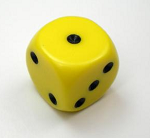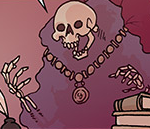|
Splicer posted:Are we at the 4.5 wishlist part of the cycle again? Because if so, cutting down on the number of combat powers you pick up is a big one. As well as building "OK so here's this power but for paragon/epic tier" into the powers themselves instead of having three different powers per power. I just want, over a decade later, any game that builds on 4E and goes further instead of "what if we backslid into 3.5 design, but we learned SOME of the lessons from 4E" or "actually, writing mechanics is really hard, have you considered a story game that has the same aesthetics but basically no tactics or system mastery?" e: Gamma World 7E and Strike! are solid lateral picks and the closest games I know to what I'm asking for, but speaking ideally, I don't really want that level of streamlining either -- I'm looking more for "elegant and consistent complexity, instead of a sprawling mess" rather than "4E with half the subsystems pulled out." Tuxedo Catfish fucked around with this message at 09:51 on May 8, 2020 |
|
|
|

|
| # ? Jun 11, 2024 19:59 |
|
Tuxedo Catfish posted:I just want, over a decade later, any game that builds on 4E and goes further instead of "what if we backslid into 3.5 design, but we learned SOME of the lessons from 4E" or "actually, writing mechanics is really hard, have you considered a story game that has the same aesthetics but basically no tactics or system mastery?"
|
|
|
|
At least we've already got a goon-led project in that direction in Let Thrones Beware, which I promised to playtest literally years ago and still intend to, but, well, executive dysfunction is a fucker. 
|
|
|
|
Well if we're starting I always liked those Bard powers whose beneficial effects ride on hitting a certain enemy, allowing a tactically minded Bard player to subtly direct their group but leave the spotlight to them, while less tactically minded players can use the same powers going with the flow of what the other players do.
|
|
|
|
Apropos of nothing, are there any systems that use an mp system for spell casting? I suppose the follow up question is are there any systems that use an mp system that aren't terrible?
|
|
|
|
Tuxedo Catfish posted:I just want, over a decade later, any game that builds on 4E and goes further instead of "what if we backslid into 3.5 design, but we learned SOME of the lessons from 4E" or "actually, writing mechanics is really hard, have you considered a story game that has the same aesthetics but basically no tactics or system mastery?" I mean, I'm not a huge mech person, but Lancer is A+ in that regard.
|
|
|
|
GimpInBlack posted:To bounce back to this, does anybody know of any good hacks to replace the BW conflict system in Torchbearer? I love the concept of the game and all the survival/inventory aspects of it, but I just have a visceral dislike of the "pick your next three actions" conflict system. I recognize that it's a well-designed system, it just really doesn't appeal to me personally. It's that your issue or do you have other issues? I do have some rules for a kind of similar kind of different system I've been working on that could be slotted in. Depending on why you dislike it, it might address your complaints or it might fall prey to those same complaints.
|
|
|
|
credburn posted:Hey gang, I want to play Shadowrun with some of my pals. I've never played anything but a little White Wolf and D20 stuff. As a new guy not wanting to spend a lot of money, what book(s) do I need to get? I thought this would be easy, but apparently Shadowrun has had a lot of weird evolutions since the local comic book guy tried to sell on it. As a long-time fan of Shadowrun, steal the setting and run it in a better system. FATE if you want rules light, The Sprawl if you want something PbtA flavored, Fragged Empire for tactical shootmans action, or GURPS if you need the technical crunch. If you must use a mainline Shadowrun system, 3rd edition is probably the least jacked up. Avoid 6th edition and Anarchy at all costs.
|
|
|
|
grassy gnoll posted:If you must use a mainline Shadowrun system, 3rd edition is probably the least jacked up. Avoid 6th edition and Anarchy at all costs.
|
|
|
|
GimpInBlack posted:To bounce back to this, does anybody know of any good hacks to replace the BW conflict system in Torchbearer? I love the concept of the game and all the survival/inventory aspects of it, but I just have a visceral dislike of the "pick your next three actions" conflict system. I recognize that it's a well-designed system, it just really doesn't appeal to me personally. If any exist, I haven't heard of them, likely because the amount of work it would take to make that sort of hack would be, uh, daunting. You'd need something that handles all the types of conflicts that Torchbearer's extended conflict system covers, and also ties back into all the other mechanisms of play: the grind, conditions, checks, fate and persona, etc. Like everything else that comes out of Burning Wheel HQ, whether it's written by Thor or Luke, Torchbearer is a Swiss watch of intricately interconnected systems that can be hacked to good effect, but only with experience and intent, and even then only up to a point.
|
|
|
|
Jimbozig posted:IMO it's easily the weakest part of the game. In many situations, there is a simple dominant strategy of just choosing attack with each action. It might be worth choosing other actions if you substantially outgun your opponent in terms of dice, but that rarely happens because the opposition is so tough. Mostly what happens is that people pick other actions because they have more dice for those other actions. Assuming you can muster an equal amount of dice, attacking is best. The big downside to just attacking is that you might win the race to zero disposition, but attack vs attack is two independent tests so you'll also lose a bunch of disposition. And when you end a fight you compromise depending on how much dispo you lost - if you lose more than half your dispo every fight because you just spam attack, you're going to be hurt pretty badly. (it actually took us a while to notice that AvA was two independent tests rather than a contested one and until we did that attack-always was dominant as you say) GimpInBlack posted:To bounce back to this, does anybody know of any good hacks to replace the BW conflict system in Torchbearer? I love the concept of the game and all the survival/inventory aspects of it, but I just have a visceral dislike of the "pick your next three actions" conflict system. I recognize that it's a well-designed system, it just really doesn't appeal to me personally. Can always fall back to straight Fighter tests from whoever's leading the battle if you don't want a detailed fight.
|
|
|
|
thetoughestbean posted:Apropos of nothing, are there any systems that use an mp system for spell casting? I suppose the follow up question is are there any systems that use an mp system that aren't terrible? Ryuutama, and Ryuutama.
|
|
|
|
xiw posted:The big downside to just attacking is that you might win the race to zero disposition, but attack vs attack is two independent tests so you'll also lose a bunch of disposition. AvA is independent, sure, but let's look at the other moves: Maneuver is just inefficient. You are spending successes to get 50/50 chances at successes. Feint is vulnerable: if they chose attack, you are screwed royally. At least if they chose Defend, you get an advantage. I could see you choosing Feint to good effect if your GM is predictable (by accident or on purpose). Defend is vulnerable: if they chose Feint, you are screwed royally. Even if they didn't, even if they chose attack, you have no advantage over them. If they have more dice than you, they will deal some damage and you will do nothing. You would only ever want to choose Defend if you significantly outmatched your opponent, because then you can actually have a good shot at recovering disposition. Or, like I said, you might well choose one of these other actions because you have more dice in them than you do in the Skill you need for attack. I mostly have experience with Mouse Guard, which has basically the same system. In MG, the opponents tend to have a LOT of dice. The seasons are strong, and the mice face animals far stronger than them. In the face of that, using Defend is just losing ground. You're far more likely to lose disposition than regain it unless the GM was foolish (or kind) enough to choose maneuver. In fact, I'd go so far as to say that if the GM scripted Attack/Attack/Attack in every round, the players would have no hope of winning except by getting very lucky rolls. The players only have a chance because they play smart and pick actions to maximize their dice while the GM faffs around using moves he knows aren't the best mechanically but make for fun descriptions. So that's what I've always done when GMing - chosen whatever random moves, thrown in some early maneuvers to make sure the player have a chance, and to make it more fun when I describe the things going on. And it is fun and I like it! But I would like it more if the GM could actually play hard. I would like it more if there was some counterplay against using Attack. Now maybe Torchbearer is way more forgiving and easy than Mouse Guard. That's not the reputation it has, but it could be the case. If the players regularly outgun their opposition then yeah, they should use attack a couple of times to get a lead, maybe throw in a defend to recover their lost disposition after that (but watch out because the GM might get wise to that and feint if you do it too often). But answer this: if the opponent has an equal number of dice as you on each roll, and the opponent always chooses Attack, is there anything you can script to tilt the odds in your favor? It seems to me that the answer is no, you are going to be 50/50 with any combination of attack and defense, and worse than 50/50 if you use Feint or Maneuver. Years ago I actually programmed and ran some simulations about Burning Wheel and came to the same conclusion about Duel of Wits. If you are stronger than the opposition by 2 dice or more, you can get good mileage out of using rebuttal and such. But if you match your opponent or are behind, then your best hope is to script nothing but Point and hope either they script badly or the dice favor you.
|
|
|
|
mllaneza posted:Cyberpunk 2020 has a good amount of crunch, that might set you up right. Bill Fawcett wrote one I think, back in 1980 or something. I can't remember if it was Spain or not. Also, CP2020 does not suck.
|
|
|
|
Serf posted:sometimes i crack open the menace manual and remember the bizarre poo poo that was in there, like the zeikune scrolling down this picture was an adventure
|
|
|
|
Jimbozig posted:Years ago I actually programmed and ran some simulations about Burning Wheel and came to the same conclusion about Duel of Wits. If you are stronger than the opposition by 2 dice or more, you can get good mileage out of using rebuttal and such. But if you match your opponent or are behind, then your best hope is to script nothing but Point and hope either they script badly or the dice favor you. Back when I played Burning Wheel I played a talky character, and we quickly arrived at the conclusion that point-point-point was the optimal strategy for basically exactly the reasons described. Like, yeah, you'll take more damage to your own disposition, but if you do anything else versus a point-point-point strategy you'll a) take even more damage and b) lose. The 'choose three' minigame is terrible because it looks like a game of cunning move and countermove, but because you script all three moves in advance there's no counterplay -- you just pick what looks good and hope for the best.
|
|
|
|
Humbug Scoolbus posted:Also, CP2020 does not suck. CP2020 definitely has some good bones, but I have a few objections to the base system that I'd recommend analysing and deciding if you want to houserule some stuff. The Humanity system is randomly and arbitrarily punishing for buying cyberware and the fact it's a 1d10 roll with critical failure on a 1 no matter your modifier means according to RAW you've always got a 1 in 10 chance of slipping on a banana peel or shooting your friend in the face.
|
|
|
|
Zeerust posted:CP2020 definitely has some good bones, but I have a few objections to the base system that I'd recommend analysing and deciding if you want to houserule some stuff. The Humanity system is randomly and arbitrarily punishing for buying cyberware and the fact it's a 1d10 roll with critical failure on a 1 no matter your modifier means according to RAW you've always got a 1 in 10 chance of slipping on a banana peel or shooting your friend in the face. Yeah CP2020 is a very 90's game. Like it's telling just how bad Shadowrun is that it's gotten worse with time, but I can't think of anything more 90's than punishing players for doing what you know your game/genre encourages them to do and you know they really want to, because mature gamers are better than that. Oh it also still suffers from the pitfall of most shadowrun editions where 'your wheelman/engineer type and hacker play their own minigame, so either your should run a game of pure deckers, or leave both of those roles as npcs'
|
|
|
|
Or get a secondary GM to go to the other side of a big room and play out those minigames, hollering updates back.
|
|
|
|
potatocubed posted:Back when I played Burning Wheel I played a talky character, and we quickly arrived at the conclusion that point-point-point was the optimal strategy for basically exactly the reasons described. Like, yeah, you'll take more damage to your own disposition, but if you do anything else versus a point-point-point strategy you'll a) take even more damage and b) lose. As the forum's designated Burning Wheel stan who's been playing it on a regular basis for over 15 years with literally hundreds of sessions played, and has outscripted one of designers in Fight: this is not actually true when you're playing with people who know the system. Point-Point-Point is good when you heavily outgun your opponent in social conflict and you can expect to blow them out of the water in one exchange, but it leaves you open to something like Dismiss-Hesitate-Dismiss, which is enough to make anyone's disposition pool blanch even when it comes from an unskilled opponent. And against a character who's closer to parity with you that you can't take out in a single exchange, yeah, you'll probably win if you Point until they drop, but you'll be paying heavily in your compromises when they catch on to what you're doing. And if the compromises being forced on you aren't teeth-grindingly painful, you're doing it wrong. And this is normal! I'm not criticizing, because the thing your group experienced is so common that the Adventure Burner devoted wordcount to it. Burning Wheel is a weird game in that it expects you to play long campaigns of 30+ sessions minimum, and to grow into an understanding of the conflict mechanics over the course of many DoWs / Fights / Range & Covers. If your opinion is set in stone on how BW conflicts work, I won't waste anyone's time with trying to persuade you, but if you're actually interested it's a subject I'm happy to go deeper in to.
|
|
|
|
Zeerust posted:CP2020 definitely has some good bones, but I have a few objections to the base system that I'd recommend analysing and deciding if you want to houserule some stuff. The Humanity system is randomly and arbitrarily punishing for buying cyberware The last time my crew thought about giving CP2020 a try, one of our characters went cyberpsychotic in the last step of character creation.
|
|
|
|
Kestral posted:As the forum's designated Burning Wheel stan who's been playing it on a regular basis for over 15 years with literally hundreds of sessions played, and has outscripted one of designers in Fight: this is not actually true when you're playing with people who know the system. Point-Point-Point is good when you heavily outgun your opponent in social conflict and you can expect to blow them out of the water in one exchange, but it leaves you open to something like Dismiss-Hesitate-Dismiss, which is enough to make anyone's disposition pool blanch even when it comes from an unskilled opponent. And against a character who's closer to parity with you that you can't take out in a single exchange, yeah, you'll probably win if you Point until they drop, but you'll be paying heavily in your compromises when they catch on to what you're doing. And if the compromises being forced on you aren't teeth-grindingly painful, you're doing it wrong. Yes, go deeper! Let's say you do not outgun your opponent. Let's say they outgun you by a die or two. Case 1: they are scripting p-p-p. You are basically screwed. The only hope you have of winning is also scripting p-p-p and hoping to get lucky. Dismiss/hesitate/dismiss might be similar depending on how many dice you have, but probably no better than p-p-p. And yeah, you'll owe a big compromise if you win, but they outgun you! You would be lucky to win at all! Case 2: they script other things because they want to push their advantage to try to win without giving you much of a compromise. Now if you think you have a good read on them and know when they will defend then sure, throw in a feint. But if you are wrong, you will get owned for it and don't even get much of a compromise. If you just p-p-p, that gives you your best hope of winning or at least being owed a big compromise. Now it is a little more complicated than that because Dismiss is a thing, and if your opponent is playing defensive, using dismisses instead of points might be a good strategy for some sizes of dice pool. Torchbearer and Mouse Guard don't have that type of option at all, making the problem worse. But the fact is that if you are outgunned and you use any defensive option at all, you are just losing ground. Every avoid or rebuttal or obfuscation you script is taking you closer to defeat - they will tend to win the vs tests if they script a point, and your defense is worse than attacking if they don't script a point. You can't preserve your disposition effectively, so you are better off just tearing down theirs as hard and fast as you can. If you are at even strength, the problem is even worse! When you are outgunned, your opponent has an incentive to use defensive moves to try to lessen the compromise they owe you, which opens up the option for you to use feints and dismisses with more effectiveness. But at even strength, both of you should refrain from using defensive moves, which means that neither of you get anything from feint and that dismiss is probably going to lower your win %. Back when I ran simulations, I didn't consider all scenarios, and like I said, if you have a couple of dice on them then you want to consider scripting other stuff. But the even-strength ones were very clear: p-p-p for both sides is absolutely a Nash equilibrium, and I'm pretty confident it's strictly optimal unless your opponent is scripting garbage, faffing around, and giving you easy openings.
|
|
|
|
Our Torchbearer GM does a really good job of describing moves and "equipment" for their Torchbearer characters, and while we (PCs) end up discussing whether a "screeching howl of rage while flying overhead" is a Maneuver or a Feint, and does a good job of scripting dumb creatures so we can learn patterns. I have a lot of ways that I think Torchbearer (I can't speak to other BW games) is weird constrained, but I think its conflict system is really cool. I've put a lot of thought and effort into ways to tear it out of BW, because I find the rest of the game unfun. But its conflict system is really slick.
|
|
|
|
Parkreiner posted:The last time my crew thought about giving CP2020 a try, one of our characters went cyberpsychotic in the last step of character creation. Humanity is just a bad system. It punishes players for interacting with its core advancement system, and it pushes the troubling troubling idea that prosthetics make you less human. I understand the intent of the system - it's a mechanical enforcement of the pressure your character is under to sublimate their personhood to become a more effective tool, a walking gun corps and partisans can point at one another. But enforcing that through a number going down is cheap and arbitrary. The gameplay loop itself incentivises augmentation because your skill growth is so slow and combat so absurdly lethal. Getting cyberware feels like the only way of getting and maintaining an edge, but the more you get, the more risks you're willing to take. The more risks you take, the more you'll find yourself relying on new and better cyber to survive.
|
|
|
|
Jimbozig posted:Yes, go deeper! The disconnect here is that you’re only looking at it from a perspective of who wins the conflict, when DoW’s compromises create a continuum of outcomes instead of a binary. Case 1: They outgun you in Duel of Wits stats by 2D, or an average of +1 success per volley. They script PPP and the math says they’re going to win by around +3s over the course of the exchange. You script either PPP or DHD depending on how saucy you’re feeling or if you’ve got relevant traits, and a perfectly average series of rolls will give you a full compromise – which, again, should hurt, and hurt enough to make someone think twice about whether going all-in like that is what they want. And if it is – that is, if the thing they’re fighting for is worth any price – then godspeed to them, they deserve the win. “Fight for what you believe in,” after all! In Case 2, Feints aren’t the only option for a more complex Duel strategy. But as I write this, I realize that I should do the thing that they’re always calling for on the BW forums, which is, “ground the discussion in actual play.” I recall having some fairly detailed notes on a DoW from a recent campaign, so I’m going to go dig those up and follow up on this conversation tomorrow. What I’ll say for now though is that anything above a Minor Compromise shouldn’t be undervalued. Remember, the corebook straight-up tells us that a Major Compromise “should feel like losing,” and a regular Compromise is a significant concession; if you're close to parity with someone, odds are better than 50/50 that you'll come away with the right to demand something from the victor that they're going to live to regret. If your table understands that they might really have the screws put to them even if they win, that has to change the calculus of pure-offense strategies.
|
|
|
|
Zeerust posted:Humanity is just a bad system. It punishes players for interacting with its core advancement system, and it pushes the troubling troubling idea that prosthetics make you less human. Eh, not sure about that last one, partially because one of my favorite games, Polaris, centralizes it. "Getting stronger makes you worse at knowing how to use that strength" is a cool theme for a game to centralize. I dislike how cyberpunk (not any single game but honestly the Genre) do the specific implementation that you mention where it implies that it's not power but prosthesis that makes you inhuman. There's been some really great writing from disability circles that fiction about cyborgs is frequently utterly careless to the perspectives of any people who actually live with prostheses in the current day.
|
|
|
|
Kestral posted:
I'm also interested in how this applies to the simpler conflict rules of Mouse Guard or Torchbearer, which is where this discussion started. I really think that A/A/A is much stronger there. In Duel of Wits, Obfuscate can't be beaten by Feint, so you have a defensive option that is not vulnerable, but in TB and MG, there is no such option, and nothing equivalent to Dismiss or Incite either. I don't know if you have any experience there. My experience with Mouse Guard is that players don't really strategize. They choose the thing that gets them the most dice. If they are fighting an owl, the player with the best Fighter skill always chooses Attack, and everyone else who has Fighter or Hunter helps them. Players with no Fighter or weak Fighter skills choose Defend so they can use their Nature or a stronger skill and get more dice. They might throw in a Feint here and there if they think I'm being predictable as GM, but usually not. The variations in player dice pools mean that they do pick different actions from one another, but each player more-or-less always chooses the same thing. The team captain deciding which order to put the mice is the only thing I'd call strategic. As GM as the owl, if I wanted to win or to get the biggest compromise, I would be hard pressed to do better than attack/attack/attack. I've got the same number of dice no matter what I do. But I don't want to win, I want to make it fun for the players, so I script other stuff that I know is less effective. You say that as the one with more dice (the owl usually has more dice than the mice), I should script things other than attack in order to both win and minimize the compromise, but that's not my experience at all. In my experience, scripting that other stuff doesn't improve the compromise I owe -- it lets the mice win! I would probably win more just by never maneuvering, since maneuver is easily the most inefficient action. Edit: I'm super interested in this right now because I've been revisiting and totally overhauling Team Conflict in Strike! and all of these issues have been at the front of my mind. Jimbozig fucked around with this message at 16:26 on May 10, 2020 |
|
|
|
I just want a cyberpunk game that lets me play Molly Millions. Not the physical razorfingered street samurai, that’s easy, but the actual core idea of a person who’s trying to use augmentation and attitude to become an action hero, and whose internal struggle isn’t ‘have I become inhuman’ or a loss of empathy, but the fracture between self-image and what’s possible under capitalism. Also, the fact that her ideal of an action hero isn’t actually good for her. Basically augmentations should be ‘bad’ to the extent they are because they narrow a person down into a role, as noted; but they can also be a way of self-actualizing. That’s the original cyberpunk cyborg street samurai’s deal, and it’s disappointing that every system just makes more metal = less human. Molly’s very human and her augmentations aren’t necessarily a good idea but it’s not because they dehumanize her, it’s because her self-actualization is kinda hosed up under capitalism anyways and the augmentations accelerate that, which is very human.
|
|
|
|
A friend of mine had plans to run a cyberpunk setting where the peril of augmentation wasn't that putting metal in you made you less human, but that the people who manufactured that metal did so under a proprietary license and if you didn't keep up your monthly payment plan your eyeballs would switch to the ad-supported revenue model.
|
|
|
|
Whybird posted:A friend of mine had plans to run a cyberpunk setting where the peril of augmentation wasn't that putting metal in you made you less human, but that the people who manufactured that metal did so under a proprietary license and if you didn't keep up your monthly payment plan your eyeballs would switch to the ad-supported revenue model. This rules
|
|
|
|
I mentioned this in F&F but in many games the humanity penalties are totally out of whack for being actually representative of dehumanisation and obviously tuned only for game balance. Having a bomb placed in your head that explodes if you disobey? Should be a mind shattering experience, but has no penalty in SR because it doesn’t increase your power. Wiring your limbs to accept commands from a chip that uploads skills you don’t have? Essentially making yourself a robot because that’s more competent than the human you? Lower essence cost than a regular artificial leg.
|
|
|
|
Whybird posted:A friend of mine had plans to run a cyberpunk setting where the peril of augmentation wasn't that putting metal in you made you less human, but that the people who manufactured that metal did so under a proprietary license and if you didn't keep up your monthly payment plan your eyeballs would switch to the ad-supported revenue model.
|
|
|
|
Zorak of Michigan posted:Or get a secondary GM to go to the other side of a big room and play out those minigames, hollering updates back. We did something like this in college. We had the big rec room in the dorm basement and at least a dozen people. We scattered the players around the room according to how they were grouped up in-game, and the Fixer I was playing took a corner with a couch, a table and some chairs. If you needed to talk to Tree about a deal, you went over and talked to me. The GM floated between groups and sometimes we had a private chat to keep things lined up. At the end, the "winning" players came to me to turn their loot into cash. I added up the street value, offered them 10%, and they couldn't take the money fast enough. I figure Tree made 3-400% on that night's work. It was great and I wish that had turned into a regular event.
|
|
|
|
Jimbozig posted:Now maybe Torchbearer is way more forgiving and easy than Mouse Guard. That's not the reputation it has, but it could be the case. If the players regularly outgun their opposition then yeah, they should use attack a couple of times to get a lead, maybe throw in a defend to recover their lost disposition after that (but watch out because the GM might get wise to that and feint if you do it too often). I've been playing Torchbearer steadily for about four years now. You're partially right in that attack/attack/attack is, weirdly, the conservative option that will never lead to a particularly bad outcome. But there's a number of things that swing the game towards other actions. Maneuver/defend weapons tend to be more powerful than attack/feint. Shield, bow and sling each give +2D to their action, where the best attack/feint weapons give +s (which does nothing if you don't win the test in the first place). There's also the fact that in the most common conflict types, attack and feint use fighter where defend and maneuver use a stat. Starting fighter ranges from 0 to 4 where starting stats range from 2 to 6. And advancing stats is a lot easier than advancing fighter, which tends to be a giant pain in the rear end to advance. So say you have a cleric, you put 6 points into will, you have a sling, that gives you 8 dice maneuvers vs the pitiful 2 dice you'd have for an attack. There's also the fact that you can't afford to just slug out every conflict and eat compromises or you'll be ground into dust before the end of the dungeon. Sometimes there's a big kill conflict that you can't afford to lose and it's worth just pouring all your dice into attacks and eating the horrific compromise, but those aren't especially common situations to be in. A big part of being successful in Torchbearer is winning conflicts without taking major compromises in the process, and triple attacks are rarely going to get you that, unless you have weapons that turn attack vs attack into a versus test and you outgun the opposition enough that they can't land a hit. Colonel Cool fucked around with this message at 23:08 on May 10, 2020 |
|
|
|
When my group was playing torchbearer we thought the conflict system did a pretty good job of keeping everyone at the table engaged for the entire combat. e: we also figured out real quick to avoid the hell out of kill conflicts if we could drive off instead.
|
|
|
|
Berkshire Hunts posted:e: we also figured out real quick to avoid the hell out of kill conflicts if we could drive off instead. I love this so much just because it turns losing as PCs into 'okay you run away and now you're completely loving lost, the real adventure starts now'
|
|
|
Tulip posted:Eh, not sure about that last one, partially because one of my favorite games, Polaris, centralizes it. "Getting stronger makes you worse at knowing how to use that strength" is a cool theme for a game to centralize. I dislike how cyberpunk (not any single game but honestly the Genre) do the specific implementation that you mention where it implies that it's not power but prosthesis that makes you inhuman.
|
|
|
|
|
Colonel Cool posted:I've been playing Torchbearer steadily for about four years now. You're partially right in that attack/attack/attack is, weirdly, the conservative option that will never lead to a particularly bad outcome. Yeah but again, that assumes you are in the position of having more dice than the opposition. In my experience with Mouse Guard, it's the opposite. The enemies have more dice than the mice on nearly every volley. In that context, the mice aiming to win with very little compromise is only plausible if the GM is basically trying to lose. So they can aim for losing with a big compromise or just barely winning, which are plausible if they script A/A/A and the GM doesn't. And yeah, like I said earlier, some characters can't use attack effectively and will use defend because they have more dice.
|
|
|
|
Jimbozig posted:Yeah but again, that assumes you are in the position of having more dice than the opposition. In my experience with Mouse Guard, it's the opposite. The enemies have more dice than the mice on nearly every volley. In that context, the mice aiming to win with very little compromise is only plausible if the GM is basically trying to lose. So they can aim for losing with a big compromise or just barely winning, which are plausible if they script A/A/A and the GM doesn't. And yeah, like I said earlier, some characters can't use attack effectively and will use defend because they have more dice. I haven't played Mouse Guard, but in Torchbearer, at least, if the opposition has more dice than you is exactly when you need to get clever with your scripting. If you just Attack every time, a canny opponent will script Maneuvers to make the inevitable independent Attacks less damaging on them, and Defends to regain the disposition lost to those independent Attacks and wind up with a flawless victory or minor compromise.
|
|
|
|

|
| # ? Jun 11, 2024 19:59 |
|
Colonel Cool posted:I haven't played Mouse Guard, but in Torchbearer, at least, if the opposition has more dice than you is exactly when you need to get clever with your scripting. If you just Attack every time, a canny opponent will script Maneuvers to make the inevitable independent Attacks less damaging on them, and Defends to regain the disposition lost to those independent Attacks and wind up with a flawless victory or minor compromise. No, this is what I've run simulations on. Trying to get clever with scripting is more likely to get you badly beaten. Scripting A/A/A is great because the opponent who has more dice is going to try to script defensive stuff in the hopes of winning with little compromise, but the dice are swingy enough that if they try that a lot of times, one time they're going to roll nothing but blanks and lose a big chunk of disposition. Their defensive successes with things like maneuver are only half as efficient as your attack successes. Taking the pressure off is what lets them regain their disposition. If they are scripting too much defense, you throw in a Feint, sure. But you should never ever script D or M when you have fewer dice than the opponent (again, unless your character doesn't have the skills to A or F effectively). Like, what could the enemy with more dice possibly script that would make Defend a good option against them, let alone the best option?
|
|
|









































